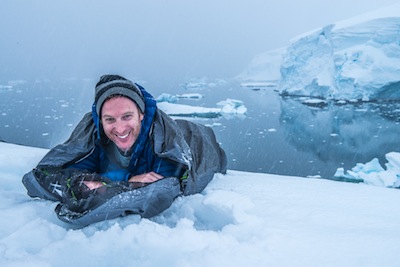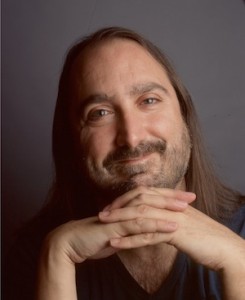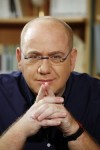Dov Elbaum speaks in Vancouver on March 30. (photo by Sasson Tiram)
Israeli journalist, writer and television host Dov Elbaum will be visiting Vancouver for a Cherie Smith JCCGV Jewish Book Festival-sponsored talk at the Jewish Community Centre of Greater Vancouver on March 30.
Starting his career in print media, Elbaum moved into book publishing and writing for television. Eventually, he moved in front of the camera; since 2007, he has hosted the popular parashat hashavua-themed show Mekablim Shabbat (Welcoming Shabbat). Elbaum is also involved in academic research and teaching on secular Jewish culture, and is the founder of the BINA Secular Yeshiva in south Tel Aviv. He is in Vancouver promoting the new English translation of his 2009 book Into the Fullness of the Void: A Spiritual Autobiography, and the Jewish Independent talked to him about his journey, Judaism in North America and Israel, and secular Jewish renewal.
JI: You have quite an interesting biography. While rejecting the ultra-Orthodox community you grew up in, you’ve remained deeply involved and curious about being Jewish. Where are you in your journey now?
DE: My journey from the world that I grew up in has been a long journey and it isn’t over yet. Still, I have gone through many significant points along the way. At the beginning, I was trying to get away, but today I find myself looking for a way to get to a renewed approach to Jewish culture, one that comes not through guilt or fear or obligation, but through love. And, when I approach Jewish culture in this way, through love, I see how my own path can help build connections to Jewish culture within secular Israeli society.
In the past in Israel, access to Judaism was through religious denominations, specifically Orthodox and ultra-Orthodox. Today, I am trying to find a way for secular Israeli Jews to approach Judaism positively, and not through negative definition, sof, which synagogues they don’t go to, or which mitzvot they don’t observe. In doing so, I am trying to develop new, nontraditional frameworks through which secular Israeli Jews can explore and express their Judaism. This is my current station on my journey.
JI: On the one hand, tshuva (return), on the other, she’ela (“lapsed”). Can you comment on the macro meaning of these opposite phenomena in Israeli society and perhaps what the numbers are in the two directions?
DE: I don’t think anyone has exact numbers of hozrei b’she’ela and hozrei b’tshuva in Israel. I imagine that the numbers are similar in both directions, though I might tend to believe that there are somewhat more hozrei b’tshuva. This is due largely to the fact that institutions of hazara b’tshuva receive a great deal of funding from the Israeli government as well as philanthropy from Israel and abroad.
But let’s talk about these phenomena spiritually rather than sociologically. I don’t like use of the words she’ela and tshuva in the context of exit from or entry into orthodoxy. I think that the meanings of these words in Judaism are much deeper than their current sociological use. In spiritual terms, she’ela and tshuva should be processes in every person’s life, and not connected to any one movement, denomination or label.
JI: Many of the progressive movements in Judaism in Israel have their origins in North America. How do you see North American Judaism influencing the religious landscape in Israel and vice versa?
DE: I think that Israeli culture has received quite a lot of gifts from North American Jewish thought. And, yes, I believe it’s true that a lot of the spiritual renewal in Israel has received spiritual and financial support from North American Judaism. I can also say that we Israeli Jews must give credit and appreciation to North American Judaism for teaching us how Judaism can develop and can be understood pluralistically.
At the same time, I think a most meaningful laboratory for Jewish renewal can happen when taking place in the Hebrew language and in the landscape of Jewish culture and society, as found specifically in Israel. When these ideas of Jewish renewal and pluralism come into contact with Jewish Israelis, the impact is fascinating; [it’s a contact that is experienced] much differently and more intensely so than in the Diaspora. Thus, when North American Jews come to visit and engage with Israel, they can influence as well as learn a great deal from Israel. We have much to learn from one another.
JI: In a lecture given by Micha Goodman, he suggests that Judaism in North America has been influenced by Abraham Joshua Heschel’s teachings, which were focused on the human experience. On the other hand, he says that Yeshayahu Leibovitch detested this approach, instead putting God at the centre regardless of whether this made Jews themselves feel spiritually enriched. Is this a good metaphor for Judaism in North America versus Israel?
DE: I don’t agree. I love and appreciate Micha Goodman, but I think such a metaphor of North America equals Heschel and Israel equals Leibovitch is not so precise. In fact, in recent years, I would say that Heschel’s ideas have had a much stronger impact in Israel [than those of] Leibovitch.
I don’t think that Leibovitch’s ideas had such a tangible impact on broader Israeli society. He voiced an important voice and many have been interested in his ideas, but still I don’t see the impact so directly on the ground. Heschel’s ideas, on the other hand, have had a very significant impact. Today, I feel that most of the secular Jewish renaissance movement in Israel feels closer to Heschel than to Leibovitch.
JI: There seems to be an awakening of interest in secular Jewish learning in Israel with BINA, your organization, and many other secular Jewish midrashot that have opened in recent years. Why is this happening now?
DE: I can think of a few reasons. First of all, I think that the assassination of Prime Minster [Yitzhak] Rabin in 1996 shook Israeli secular society profoundly. Secular Israeli society started to feel that they were losing hold on the country, and losing it to a particular group of religious Israelis whose mindset they no longer understood, whose world they no longer understood. Hence, a renewed interest in Judaism and the world of Jewish religion.
Second, and perhaps more importantly, secular Israeli society has been in an ongoing process of being emptied of the values upon which Israel was established. And now, the vacuum has expanded so much that secular Israelis have come to realize that if we want to continue to live in this wonderful and dangerous place called Israel, it needs to be clear to us what we are doing here. If a person doesn’t understand his or her role or purpose in this place called Israel, he or she won’t last here long. So, secular Israelis are starting to ask each other the most elementary questions of identity and purpose, and are going back to the old sources.
JI: Given all these movements, it seems possible to be both secular and connected to Judaism, but can there be continuity of such a connection over generations?
DE: First of all, that’s a great question. How do we pass these ideas and values to the upcoming generations is one of the deepest and most essential questions of Judaism. Take a look at the Sh’ma: “… and you shall teach them to your children and speak of them….” The Sh’ma asks us to make our values present in daily life. And I believe therein is the solution. In Israel, it is also easier. We speak Hebrew and live the Jewish calendar and, through the language and calendar, we can make Jewish culture present in a very tangible way. In Israel, it’s easier to be a secular Jew than in other places, because the language and the place make it easier to actualize Jewish culture in daily life without being religious in a traditional or halachic sense.
JI: Is there a manner in which knowledge and ownership of Judaism in Israel translates to political power?
DE: In the last elections, the Jewish secular renaissance in Israel earned a certain amount of political entrance through the election of MK Ruth Calderon and a few other MKs … that have understood the power and influence that this movement has, and they have seen fit to give expression to it…. The ignorance among the general public regarding the possibility of having a profound Jewish identity without connection to traditional organized religion is still widespread, and we have a lot of work to do, especially with everything that relates to public awareness and the establishment of new secular yeshivot that should receive government funding just like any other educational institution, which is something that has yet to happen.
JI: Can you talk about/explain the popularity of your show Mekablim Shabbat?
DE: I think it’s been popular because of all the things we’ve just mentioned. Israeli society has been thirsty for years for Jewish content without vestments of religion. On the show, I try to demonstrate that you don’t have to be religious in order to approach the Jewish canon, to read and explore it, to ask questions about it and about life, and to use it in order to think and to express ourselves. Israeli society has been very thirsty for meaningful Jewish content, but they don’t want it all wrapped up in religion. When I present it … without religious garb, they can connect to it.
JI: What would you like to share with the Vancouver community when you are here?
DE: That the time has come for these two different movements … to come together and think about how we can contribute to and learn from one another. We must learn from one another’s knowledge and experiences and explore how we can strengthen one another, and not let certain negative forces control and dominate the global sphere of Jewish culture and spirituality.
I look forward to opening up a dialogue and exemplifying some of the fruits of our labor in Israel through a re-reading of the Jewish sources, specifically one of the most-read texts in the Jewish tradition – the story of the Exodus from Egypt in the Passover Haggadah.
Maayan Kreitzman is a freelance writer living in Vancouver.
***
Tickets for Dov Elbaum’s March 30, 6 p.m., talk at the Jewish Community Centre of Greater Vancouver ($14/$10) are available at the centre, 604-257- 5111 and ticketpeak.com/jccgv.
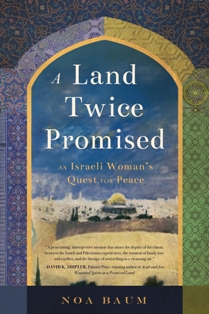 As recounted in her 2016 debut work A Land Twice Promised: An Israeli Woman’s Quest for Peace, Baum grew up with both a deep love of Israel and a keen sense of Jewish vulnerability and the wounds of the Holocaust. The narrative she grew up with about Israel centred on the heroism of its citizen army (“our boys,” she repeatedly calls them) standing up to the bewildering, relentless hatred of the Arab countries. She was deeply shaped by the experience of living through the 1967 Six Day War and the 1973 Yom Kippur War as a child.
As recounted in her 2016 debut work A Land Twice Promised: An Israeli Woman’s Quest for Peace, Baum grew up with both a deep love of Israel and a keen sense of Jewish vulnerability and the wounds of the Holocaust. The narrative she grew up with about Israel centred on the heroism of its citizen army (“our boys,” she repeatedly calls them) standing up to the bewildering, relentless hatred of the Arab countries. She was deeply shaped by the experience of living through the 1967 Six Day War and the 1973 Yom Kippur War as a child.
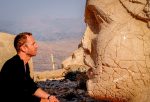
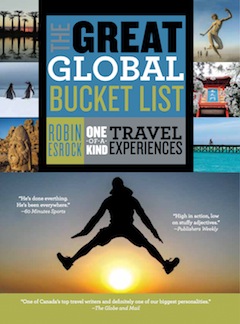 Esrock is one of the many writers participating in this year’s Cherie Smith JCC Jewish Book Festival, which runs Nov. 27-Dec. 1. The local author and journalist has not only been featured in the Jewish Independent before – for The Great Canadian Bucket List, among other things – but has written for the paper as well, so it was nice to catch up with him in anticipation of his Nov. 27, 5 p.m., presentation at the Jewish Community Centre of Greater Vancouver, appropriately called Travel Dreams.
Esrock is one of the many writers participating in this year’s Cherie Smith JCC Jewish Book Festival, which runs Nov. 27-Dec. 1. The local author and journalist has not only been featured in the Jewish Independent before – for The Great Canadian Bucket List, among other things – but has written for the paper as well, so it was nice to catch up with him in anticipation of his Nov. 27, 5 p.m., presentation at the Jewish Community Centre of Greater Vancouver, appropriately called Travel Dreams.